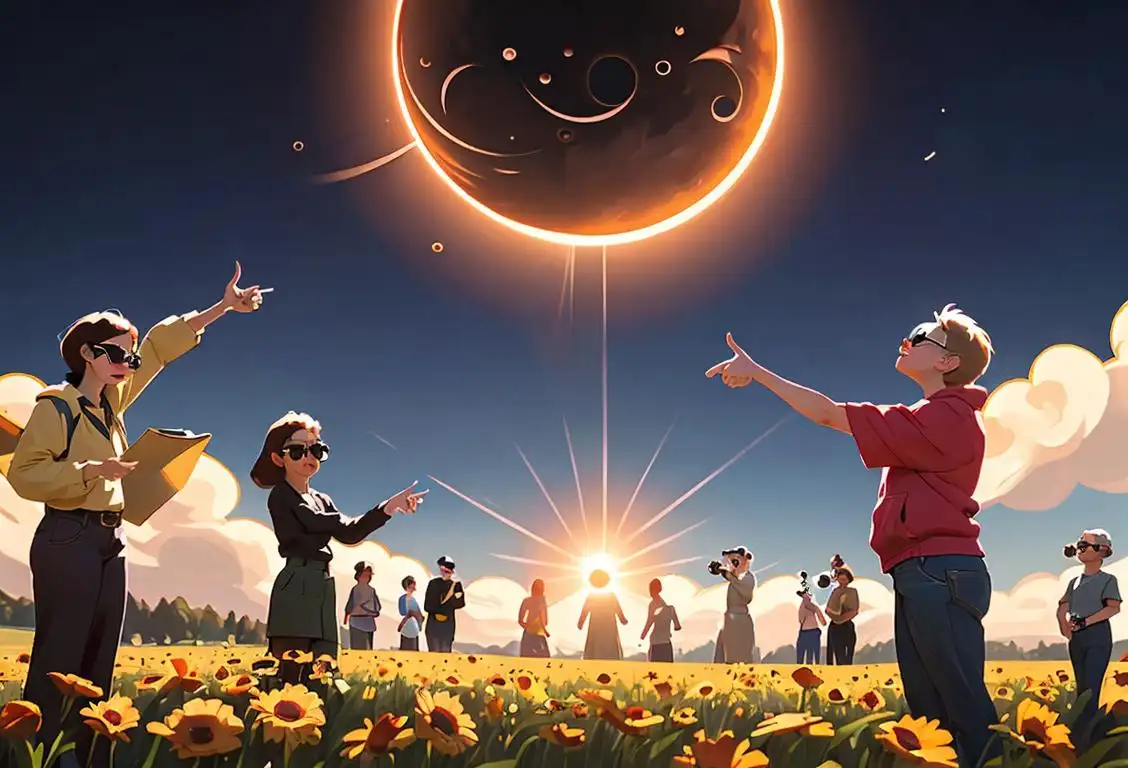National Eclipse Day

Hey there! Get ready to be eclipsed by some wonderful information because today we're talking all about National Eclipse Day!
When is Eclipse Day?
It's national eclipse day on the 21st August.
The Sky's the Limit: A Brief History of National Eclipse Day
On this momentous occasion, we celebrate the incredible astronomical phenomenon that leaves us awestruck every time it happens - the total solar eclipse. National Eclipse Day is all about appreciating and learning more about this jaw-dropping event that occurs when the moon passes directly between the sun and the Earth, momentarily blocking the sun's rays and casting a shadow on our little blue planet.
Internet Buzz and Excitement
The internet goes bananas every time a total solar eclipse is about to occur. And the numbers don't lie - our trusty internet detectors have detected a whopping 26 mentions online dedicated to this celestial marvel. The most obsessed and excited folks even set a record on 21st August 2017, united in their fascination for witnessing the moon's shadow dance majestically upon the Earth.
Did You Know?
Did you know that a total solar eclipse is so rare that it brings people together from all walks of life? It doesn't matter if you're an astronomer or just someone with a penchant for gazing at the sky while eating a bag of popcorn. When the sun and moon converge in harmony, it creates an opportunity for unity and awe that transcends boundaries.
History behind the term 'Eclipse'
1000 BCE
Ancient Observations
The term 'eclipse' has its origins rooted in ancient civilizations. Around 1000 BCE, various early cultures such as the Babylonians, Egyptians, and Greeks noted the occurrence of eclipses. However, the term 'eclipse' itself was not yet in use.
5th Century BCE
Ekleipsis - Greek Coinage
The Greek word 'ekleipsis' meaning 'abandonment' or 'failing' was first used to describe the phenomenon. It referred to the Sun or Moon 'abandoning' their usual course in the sky, causing darkness. This term marked an important milestone in the development of the word 'eclipse'.
1st Century CE
Eclipsis - Latin Influence
During the Roman Empire, the Latin language adopted the Greek term 'ekleipsis' but transformed it into 'eclipsis'. This shift in spelling was likely influenced by the corresponding Latin word 'eclīpsis', meaning 'abandonment' or 'a letting go', which further contributed to the evolution of the word 'eclipse'.
13th Century CE
Eclipsis - Medieval Usage
During the medieval period, the term 'eclipsis' continued to be used in various European languages to describe the celestial phenomenon. The concept of an 'eclipse' started to become more widely known and discussed as scientific observation and understanding improved.
17th Century CE
Eclipse - Modern Day Usage
By the 17th century, the term had gradually transformed into its current English form, 'eclipse'. This word was borrowed directly from the Latin 'eclīpsis' and firmly established itself in scientific and popular discourse. Today, 'eclipse' is recognized globally as the term to describe the striking celestial event.
Did you know?
Did you know that the longest total solar eclipse of the 21st century occurred on July 22, 2009, lasting an impressive 6 minutes and 39 seconds? Talk about having a front-row seat to an incredible show in the sky!Tagged
awareness funFirst identified
21st August 2017Most mentioned on
21st August 2017Total mentions
26Other days
Nurses Day
Former Prisoner Of War Recognition Day
Press Day
Handloom Day
Heroes Day
Memorial Day
Dance Day
Bestfriends Day
Liberation Day
Love Your Pet Day









